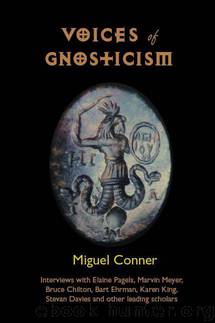Voices of Gnosticism: Interviews with Elaine Pagels, Marvin Meyer, Bart Ehrman, Bruce Chilton and Other Leading Scholars by Conner Miguel

Author:Conner, Miguel [Conner, Miguel]
Language: eng
Format: epub
Publisher: Bardic Press
Published: 2010-11-17T21:00:00+00:00
MC: And you mention Saint Paul. What are some of the reasons that Valentinus and the Valentinians were so enamoured of him?
ET: I think the Valentinians of the second century were the really great Paulinists. There are at least two aspects of Paul’s ideas. One is the one I have already mentioned, the model of salvation by some kind of exchange: the savior assumes or takes upon himself what he comes to save human beings from. Valentinus thought the savior, who is a spiritual being, assumed a material existence and made it into nothing so we could be assimilated into his spiritual existence. This is precisely the logic that we find in the letters of Paul, that the savior swallows up death, makes it into nothing, and we become integrated into him. So that logic of substitution is, I think, very basic to the Valentinians, and they took it from Paul. Of course, later Christians thought that that logic of substitution had to do with sin, and that Christ took upon himself our sins in order to make us partake of his sinlessness. Valentinians didn’t speak about sin, they spoke of flesh; he took upon himself our flesh that we might partake of his spirituality.
The second thing about Paul is that he speaks about a spiritual resurrection, and that was totally endorsed by the Valentinians. They know, just like Paul speaks in 1 Cor 15 that there is sown a material body and there arises a spiritual body. That is exactly what the Valentinians thought. They didn’t believe in the resurrection of the flesh, and they thought that Paul didn’t believe in the resurrection of the flesh either. The flesh whose resurrection they believed in was a spiritual kind of flesh, and in that respect it may be argued that maybe the Valentinians were actually closer to Paul than much of the later Christian theology that is about the resurrection of the flesh as a material body.
MC: And I guess this would beg the question, in the theology of the Valentinians, does faith have a place, or is Gnosis the only salvific option?
ET: Well, I think you can’t distinguish between faith and Gnosis with the Valentinians, and I suspect not in other Gnostics either. I think that faith is certainly a precondition for Gnosis. Unless you have faith, you cannot achieve Gnosis. You must remember that Gnosis is not something that comes out of yourself. You have only the seed that makes you able to receive Gnosis. You have to have the savior to come and ignite the spark, as it were, and make this seed grow in you, and in order for that to happen, you have to first have faith in the savior, and then allow him to teach you, and then you will acquire Gnosis. Incidentally, that is not so different from what many orthodox Christians thought too. For instance, Clement of Alexandria also thought of two stages. You have first a stage of faith which leads to a stage of knowledge.
Download
This site does not store any files on its server. We only index and link to content provided by other sites. Please contact the content providers to delete copyright contents if any and email us, we'll remove relevant links or contents immediately.
The Secret Power of Speaking God's Word by Joyce Meyer(3223)
Signature in the Cell: DNA and the Evidence for Intelligent Design by Stephen C. Meyer(3139)
Real Sex by Lauren F. Winner(3024)
The Holy Spirit by Billy Graham(2953)
The Gnostic Gospels by Pagels Elaine(2532)
Jesus by Paul Johnson(2363)
Devil, The by Almond Philip C(2333)
23:27 by H. L. Roberts(2252)
The Nativity by Geza Vermes(2233)
Chosen by God by R. C. Sproul(2165)
All Things New by John Eldredge(2163)
Angels of God: The Bible, the Church and the Heavenly Hosts by Mike Aquilina(1969)
The Return of the Gods by Erich von Daniken(1946)
Angels by Billy Graham(1926)
Knowing God by J.I. Packer(1860)
Jesus of Nazareth by Joseph Ratzinger(1811)
The Gnostic Gospel of St. Thomas by Tau Malachi(1799)
Evidence of the Afterlife by Jeffrey Long(1791)
How To Be Born Again by Billy Graham(1782)
